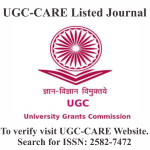DEVELOPMENT OF CRITICISM IN HINDI
हिन्दी में समालोचना का विकास
DOI:
https://doi.org/10.29121/shodhkosh.v5.i4.2024.5489Keywords:
Samalochana, Aalochana, Samyak, Prakrit, Apabhramsha, Chhayavadi, KavyashastriyaAbstract [English]
The literal meaning of criticism is to see. The proper explanation of the merits and demerits of any object, element, subject, style and work is called Samalochana. In Hindi literature, the word ‘Samalochana’ is a gift of Sanskrit. The words Samiksha and Samalochana are used as synonyms of the word Aalochana. Expressing opinion on the work by discussing its beauty and demerits is Samalochana.
Abstract [Hindi]
समालोचना का शाब्दिक अर्थ है- देखना। किसी भी वस्तु, तत्व, विषय, शैली व कृति के संदर्भ में गुण-दोषों की सम्यक् व्याख्या का नाम समालोचना है। हिन्दी साहित्य में ‘समालोचना’ शब्द संस्कृत की देन है। आलोचना शब्द के पर्याय के रूप में समीक्षा और समालोचना शब्द का प्रयोग होता है। कृति के सौन्दर्य एवं दोषों का विवेचन करके इस पर मत व्यक्त करना समालोचना है।
References
हिन्दुस्तानी त्रैमासिक, जनवरी-मार्च, 2007, संपा. डॉ. अनिल कुमार सिंह, ‘हिन्दी आलोचना: वर्तमान परिदृश्य’, डॉ. उत्तम कुमार शुक्ल, पृ. 33
हिन्दुस्तानी त्रैमासिक, जनवरी-मार्च, 2007, संपा. डॉ. अनिल कुमार सिंह, ‘हिन्दी आलोचना: वर्तमान परिदृश्य’, डॉ. उत्तम कुमार शुक्ल, पृ. 31
हिन्दुस्तानी त्रैमासिक, जनवरी-मार्च, 2007, संपा. डॉ. अनिल कुमार सिंह, ‘हिन्दी आलोचना: वर्तमान परिदृश्य’, डॉ. उत्तम कुमार शुक्ल, पृ. 32
हिन्दुस्तानी त्रैमासिक, अप्रैल-जून, 2004, हिन्दुस्तानी एकेडेमी, इलाहाबाद, सम्पादक डॉ. अनिल कुमार सिंह, ‘हिन्दी आलोचना पर छायी धुंध को हटाने का सजग प्रयास, डॉ. महेन्द्र नाथ राय, पृ. 121-122
डॉ. नगेन्द्र, आस्था के चरण, पृ. 46
आवर्त, जनवरी-अगस्त, 2001, संपा. वीरेश चन्द्र, ‘आलोचना की संस्कृति’, विश्वनाथ त्रिपाठी, पृ. 50
आवर्त, जनवरी-अगस्त, 2001, संपा. वीरेश चन्द्र, ‘आलोचना की संस्कृति’, विश्वनाथ त्रिपाठी, पृ. 51
Downloads
Published
How to Cite
Issue
Section
License
Copyright (c) 2024 Khushbu Kumari, Ram Naresh Pandit, Kalyan Kumar Jha, Sakshee Shalini, Sushant Kumar

This work is licensed under a Creative Commons Attribution 4.0 International License.
With the licence CC-BY, authors retain the copyright, allowing anyone to download, reuse, re-print, modify, distribute, and/or copy their contribution. The work must be properly attributed to its author.
It is not necessary to ask for further permission from the author or journal board.
This journal provides immediate open access to its content on the principle that making research freely available to the public supports a greater global exchange of knowledge.




















